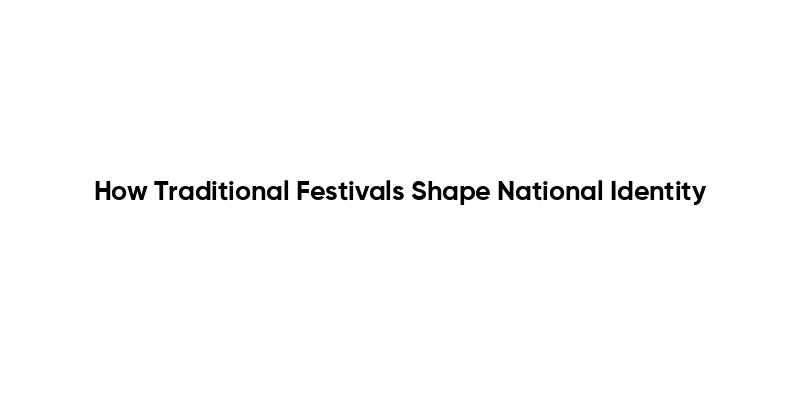Traditional festivals play a pivotal role in shaping national identity, serving as vibrant expressions of a community’s cultural heritage. These celebrations not only bring people together but also reinforce shared values, beliefs, and historical narratives. By exploring the intricate relationship between traditional festivals and national identity, we can gain a deeper understanding of how these events foster a sense of belonging and pride among citizens. In this article, we will delve into the various ways in which traditional festivals contribute to the formation and reinforcement of national identity.
As we journey through the significance of these festivals, you will learn about the diverse cultural practices that are celebrated across different nations and how they reflect the unique characteristics of each society. From colorful parades to traditional music and dance, these events encapsulate the essence of a nation’s spirit and history. Furthermore, we will examine the role of traditional festivals in promoting social cohesion and unity, especially in multicultural societies where diverse backgrounds converge.
In addition, this article will highlight the impact of globalization on traditional festivals and how communities strive to preserve their cultural identities amidst changing dynamics. By the end of this exploration, you will not only appreciate the importance of traditional festivals in shaping national identity but also be inspired to participate in or learn more about these enriching cultural experiences. Join us as we uncover the fascinating ways in which traditional festivals continue to influence and define who we are as a nation.
The Role of Cultural Heritage in Festivals
Traditional festivals serve as a vital link to a nation’s cultural heritage, showcasing the unique customs, beliefs, and practices that define a community. These events often reflect historical narratives, folklore, and the collective memory of a society, allowing individuals to connect with their roots. By celebrating these traditions, communities reinforce their identity and promote a sense of belonging among their members.
Moreover, cultural heritage is not static; it evolves over time. Festivals often incorporate contemporary elements, making them relevant to younger generations while preserving essential traditions. This dynamic interplay between the past and present helps to maintain a vibrant national identity that resonates with all age groups.
Festivals as a Means of Social Cohesion
Traditional festivals play a crucial role in fostering social cohesion within a nation. They bring together individuals from diverse backgrounds, encouraging interaction and understanding among different cultural groups. This communal experience helps to break down barriers and build relationships, ultimately contributing to a more unified national identity.
During these celebrations, shared experiences create lasting memories that strengthen community bonds. The collective participation in rituals, parades, and feasts fosters a sense of solidarity, reminding individuals of their shared values and aspirations. As a result, festivals become a powerful tool for promoting national unity and pride.
Economic Impact of Traditional Festivals
Traditional festivals often have significant economic implications for a nation. They attract tourists, generate revenue, and create job opportunities, contributing to local and national economies. The influx of visitors during these events can lead to increased spending in hospitality, retail, and entertainment sectors, showcasing the economic potential of cultural celebrations.
Furthermore, festivals can stimulate the preservation of traditional crafts and local businesses, ensuring that cultural practices are not only celebrated but also economically viable. This economic aspect reinforces the importance of festivals in shaping national identity, as they highlight the connection between culture and economic sustainability.
Festivals and National Pride
National pride is often amplified during traditional festivals, as they serve as a platform for showcasing a nation’s achievements, values, and cultural uniqueness. These events provide an opportunity for citizens to express their pride in their heritage and celebrate their identity on a grand scale. The display of traditional attire, music, and dance during festivals fosters a sense of pride and belonging among participants.
Moreover, festivals often commemorate significant historical events or figures, further instilling a sense of national pride. By honoring their past, communities reinforce their identity and inspire future generations to appreciate and uphold their cultural legacy.
The Globalization of Traditional Festivals
In an increasingly interconnected world, traditional festivals are experiencing globalization, leading to both opportunities and challenges. While globalization allows for the exchange of cultural practices and ideas, it can also threaten the authenticity of traditional celebrations. As festivals adapt to attract international audiences, there is a risk of diluting their cultural significance.
However, globalization can also enhance national identity by promoting cultural exchange and understanding. By sharing their traditions with a global audience, nations can foster appreciation for their unique heritage, ultimately strengthening their national identity in a diverse world. Balancing tradition with modernity is essential for preserving the essence of these festivals while embracing the benefits of globalization.
| Aspect | Description |
|---|---|
| Definition of Traditional Festivals | Traditional festivals are cultural celebrations that reflect the history, values, and beliefs of a community or nation. |
| Cultural Heritage | These festivals preserve and promote cultural heritage, allowing communities to connect with their past and maintain their unique identity. |
| Community Cohesion | Festivals foster a sense of belonging and unity among community members, strengthening social bonds and collective identity. |
| National Pride | Celebrating traditional festivals instills a sense of pride in national identity, showcasing the uniqueness of a nation’s culture to both citizens and visitors. |
| Economic Impact | Festivals often boost local economies through tourism, creating jobs and promoting local businesses, which can enhance national identity through economic strength. |
| Global Recognition | Unique festivals can attract international attention, contributing to a nation’s global image and cultural diplomacy. |
| Intergenerational Transmission | Festivals serve as a means for passing down traditions and values from one generation to the next, ensuring the continuity of national identity. |
| Adaptation and Change | While rooted in tradition, festivals can evolve over time, reflecting contemporary values and issues, thus keeping the national identity dynamic and relevant. |



